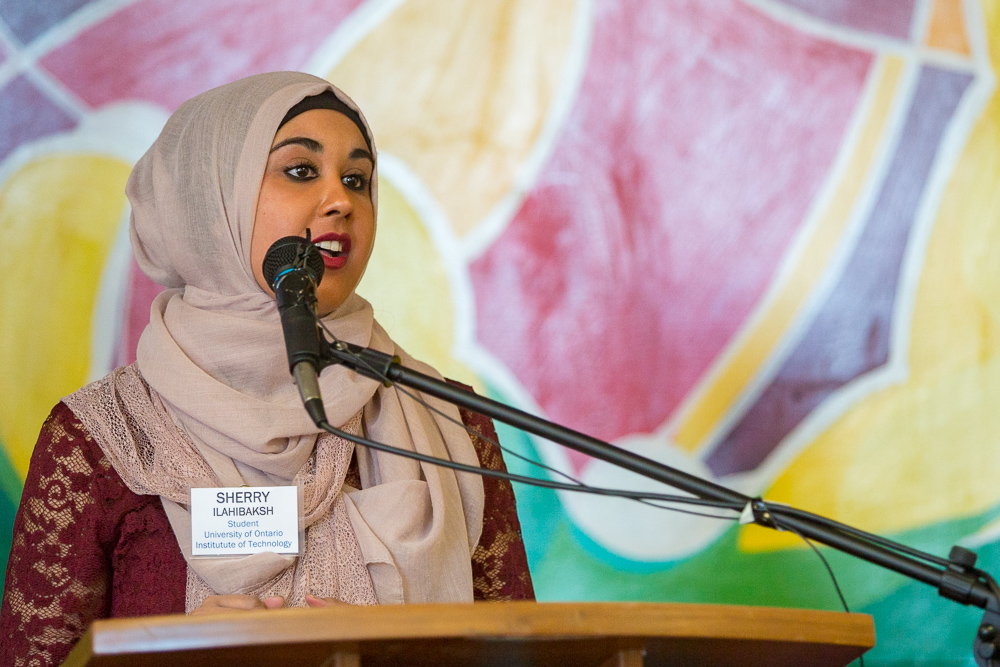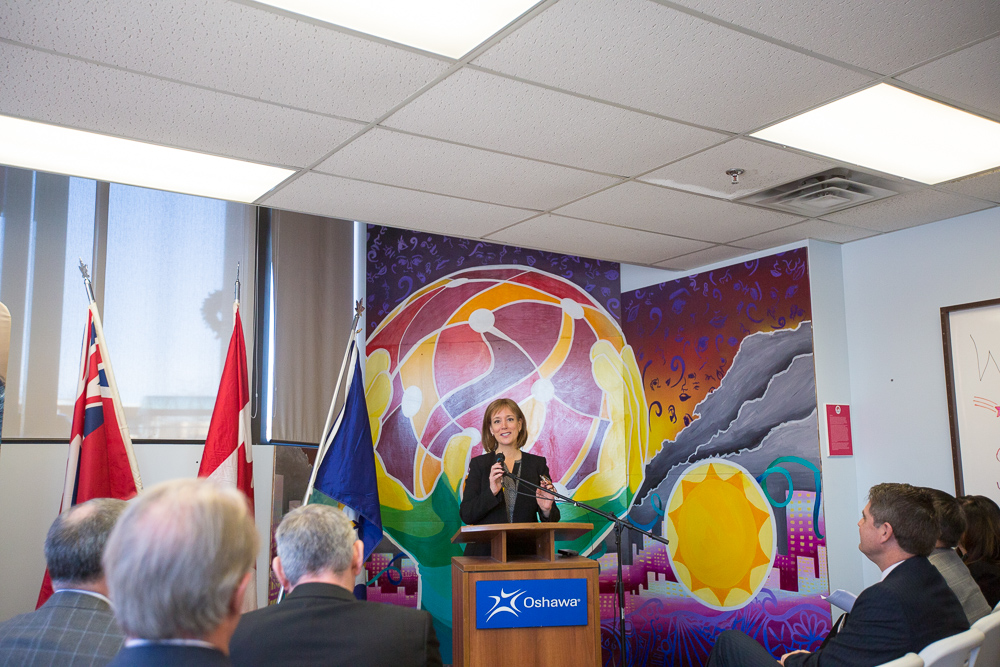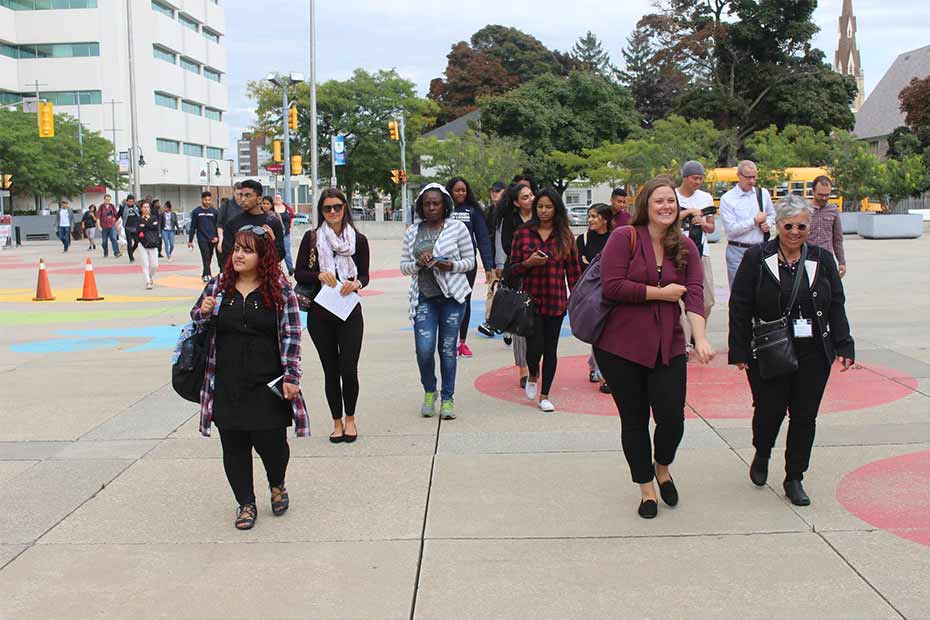Published September 30, 2019 • 4 Min Read
When you’re a student, a great week might mean receiving positive feedback on a paper you handed in, or having a group presentation go so well you’re high-fiving your classmates afterward. What students don’t usually expect is for their coursework to make a real-world change in the place they live in.
In Oshawa, real, student-led community changes are being created at City Idea Lab. At City Idea Lab students from universities and colleges collaborate with and learn from policy experts from the City of Oshawa.
A new learning model
As part of her political science undergraduate degree at Ontario Tech University, Cara Morrison took part in the first City Idea Lab program in the fall of 2018. Meeting at TeachingCity in downtown Oshawa through the semester, Morrison and her classmates participated in lectures where they’d learn about local government and transforming cities. Then they got into the hands-on learning side of the course.
Students were challenged to find answers to the question: “How might the City of Oshawa better engage youth in priority neighbourhoods?” Working in groups, the students applied each week’s lecture as they looked for solutions.

Putting ideas in motion
Morrison’s group came up with three potential ideas for priority neighbourhoods: Pre-teen community centre dances, drop-in arts programs, and educational mentorship programs where pupils at schools with low rates of post-secondary enrolment could be paired with college and university students.
The group presented their ideas to City of Oshawa staff members to evaluate what might be viable in terms of local budgets, policies and technology.
The idea with the most potential impact became clear: Morrison and her group would work on creating the mentorship program.
They imagined campus tours led by college students, and panels and workshops covering the practical aspects of post-secondary education — such as handling funding options, and how best to fill out post-secondary applications. The group wanted to shape a program to help students facing hurdles to graduation and pursuing higher education by providing stable social support and outlining paths to go to university or college.
In spring 2019, a pilot education mentorship program was rolled out at G.L. Roberts Collegiate and Vocational Institute, an Oshawa high school with low post-secondary education enrolment.
“I actually got to go and do a school panel discussion where students could ask us questions about what it’s like at college and university,” says Morrison. “The combination of excitement and fear that come with undertaking a post-secondary education is universal.”
“The students seemed very interested to hear what classes and professors are like and what opportunities might be available on campus,” she says. “But they also expressed anxiety about how difficult the coursework might be and what expectations would be placed on them.”
“Addressing this issue was an opportunity where I felt that the mentorship program could shine. Everyone on the panel was able to assure students that yes, it could be stressful, but that the bond that forms between classmates — whether in study groups or just being able to relate to one another — helps to ease the burden.”
“Providing that kind of emotional support was always an aim of my group’s vision for our program, so it was beautiful to see it in action,” Morrison says.

Experiential learning for greater engagement
The City Idea Lab is an innovative collaboration, supported by RBC Future Launch, between the City of Oshawa, Ontario Tech University, Durham College, and Trent University Durham. The program includes students from all three post-secondary institutions in Oshawa, providing them the chance to make real-world changes in their community while learning critical work skills.
“We’ve seen a need to invest in experiential learning, to inspire an innovation mindset, and to think beyond traditional models of learning,” says Marjolaine Hudon, the Regional President of RBC’s Ontario North and East Region (ce lien mène à un site web dont le contenu est en anglais seulement). “This is precisely what the City Idea Lab achieves. Programs like these help youth explore their interests, test their limits and inspire them to do more than they themselves thought they could.”
One thing is certain: The positive impacts of the program have been more wide-ranging than anticipated when the course was first designed. In the years since the first experiential learning courses at City Idea Lab, students have pursued ongoing work with the City of Oshawa, marking perhaps the beginnings of new careers.
Find out about how RBC supports Youth.
This article is intended as general information only and is not to be relied upon as constituting legal, financial or other professional advice. A professional advisor should be consulted regarding your specific situation. Information presented is believed to be factual and up-to-date but we do not guarantee its accuracy and it should not be regarded as a complete analysis of the subjects discussed. All expressions of opinion reflect the judgment of the authors as of the date of publication and are subject to change. No endorsement of any third parties or their advice, opinions, information, products or services is expressly given or implied by Royal Bank of Canada or any of its affiliates.
Any information, opinions or views provided in this document, including hyperlinks to the RBC Direct Investing Inc. website or the websites of its affiliates or third parties, are for your general information only, and are not intended to provide legal, investment, financial, accounting, tax or other professional advice. While information presented is believed to be factual and current, its accuracy is not guaranteed and it should not be regarded as a complete analysis of the subjects discussed. All expressions of opinion reflect the judgment of the author(s) as of the date of publication and are subject to change. No endorsement of any third parties or their advice, opinions, information, products or services is expressly given or implied by RBC Direct Investing Inc. or its affiliates. You should consult with your advisor before taking any action based upon the information contained in this document.
Furthermore, the products, services and securities referred to in this publication are only available in Canada and other jurisdictions where they may be legally offered for sale. Information available on the RBC Direct Investing website is intended for access by residents of Canada only, and should not be accessed from any jurisdiction outside Canada.
Share This Article






